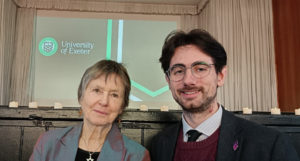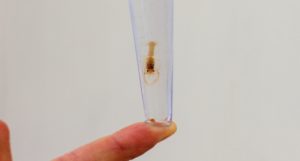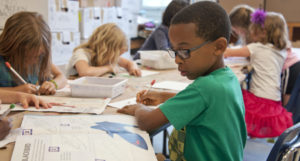Penryn Perspectives: Professor Lora Fleming CBE
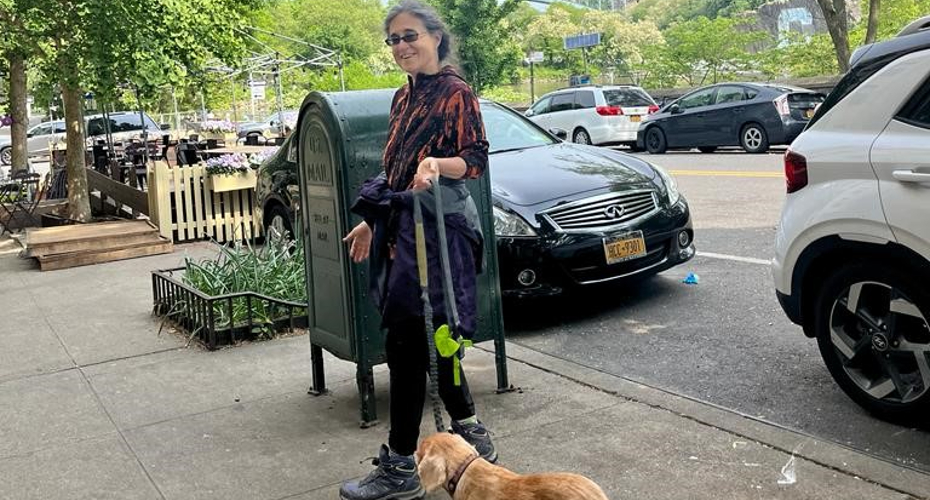
Lora with dog Kaylee
“I loved the job, the people and the place. It was a total commitment, and I don’t regret it.”
Professor Lora Fleming
Lora E. Fleming MD PhD MPH MSc Hon CBE is Emerita Professor and Chair of Oceans, Epidemiology and Human Health at the University of Exeter School of Medicine. She is the co-founder of the European Centre for Environment and Human Health (ECEHH), a pioneering body that explores the complex links between human health and the environment.
Born and raised in the US, Lora qualified as a physician from Harvard, and with a PhD in epidemiology from Yale. She began her career as a doctor working in New York’s Bronx district during the 1980s, where her passion for supporting deprived communities and inequalities first developed. Her interest in the links between environment and human health first began through the lens of the harms that the environment can cause to humans, for example through pesticides, chemicals in food and mercury. As her career developed, she expanded her interest into ocean environments – and realised that the benefits and opportunities from interacting with the natural environment, particularly blue spaces, provided opportunities to boost physical health and mental wellbeing.
After two decades of working at the University of Miami, she was one of the first global experts to bring the now internationally recognised discipline of Oceans and Human Health to Europe. She moved to Cornwall to establish Exeter’s ECEHH, alongside Professor Mike Depledge, in 2011, and it is now internationally recognised and a WHO Collaborating Centre. It boasts more than 100 staff and students making a significant impact on global policy, and has funding from all UK Research Councils, EU and Wellcome.
Lora was awarded Honorary Commander of the British Empire (CBE) in the King’s New Year’s Honours List, in recognition of her services to the environment and human health.
In this edition of the Penryn Perspectives, Lora takes us beyond the Penryn campus, widening our perspective across Cornwall – and the Atlantic.
“Thinking back to when I first arrived in Cornwall, the first thing that comes to mind is that I was cold for a year! I was freezing all the time. Even though I grew up in New England, it took me a long time to acclimatise. I mean, I love Cornish weather – and I absolutely loved its wonderful natural environment – but I was wearing layers upon layers. It probably didn’t help that I had come from Miami where I had spent the past two decades working at the University. But then, Miami was the reason I was in Cornwall in the first place, because it was where I had first pushed that marine agenda within a medical public health context. And it was through that work that I first met Mike Depledge and that started a chain of events that eventually resulted in me joining Mike, Emma Bland, Angela Shore, Ben Wheeler, and many others to co-found the Centre.
“We had a beautiful, highly bespoke space in Truro, and a lot of thought was given to how we could get people to work in an interdisciplinary environment. How could we facilitate the creation of a culture at the Centre rooted in that quality? How do we make it welcoming for the people who come from the outside? And, a thing that was new to me, how do we work with small businesses?
“Being in Cornwall meant we could experiment. We came up with some principles of who we wanted to be, and we recruited incredible people at a time when (and it’s still true to a certain extent today) Cornwall was where you’d go for a vacation. We established an incredible nucleus of people and all of us tried to make it a positive place to work, and I think that was very important in the long run.”
“Of course, we made a lot of mistakes along the way, but that was OK, because we were learning on the job and experimenting. It’s always important to remember that the world does not end if you get something wrong. We had a lot of risk-taking early career researchers in an area that didn’t have a lot of traction at that time; people were not researching in that space of human health in the environment or doing evidence-based research. And being reactive to the funding helped us to be nimble. We also thought big. Becoming a WHO collaborating centre took seven years, but we did it, and it was transformative for our research profile.
“As we became better known, alongside the growth of the Medical School, I do think Cornwall became proud of us. And one thing we did was identify issues in Cornwall that could also go global, and vice versa, such as in regions like Southeast Asia. A lot of our early research on microbial pollution, for example, was founded on the use of Cornish waters.
“I’m truly proud of the people I worked with and all that they’ve accomplished. You know, there’s a real legacy embodied within those people, and not just those who were based at the Centre but colleagues and collaborators of all different types in Cornwall and around the world. I’m so proud of that. I believe that environment and human health is now on a lot of people’s radar, including the public health and medical communities, which was not true at the outset.”
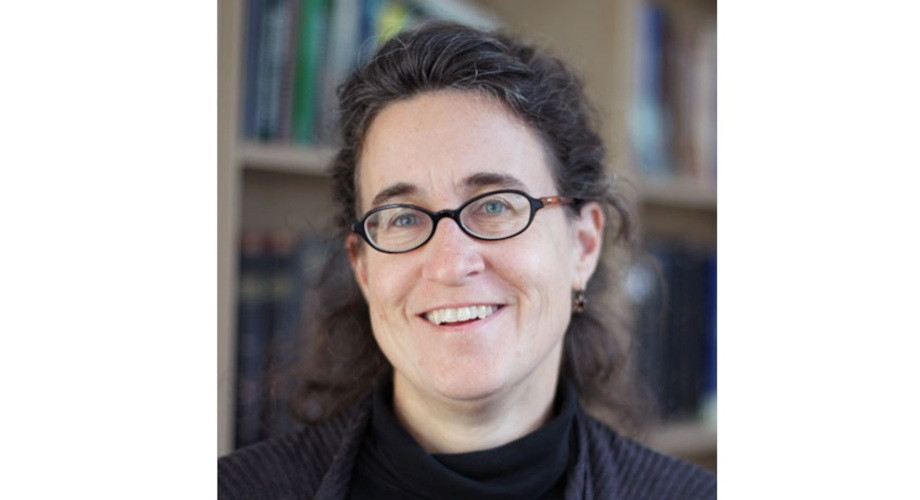
“When the Centre launched, it had four years of funding, and one of the conditions was that we were not permitted to teach. But after that point, we needed to diversify. We created a Masters in Environment and Human Health and several modules, like Living with Environmental Change and Oceans and Human Health, and to their credit, Penryn let us teach students there as well as in the Medical School. And I loved going to Penryn to teach. The fact you could have Falmouth students alongside Camborne School of Mines…that diversity was fabulous. The campus had interesting architecture and every time I went, I would find a new place – a new garden, a new view – and it was changing all the time. I developed valued colleagues in the ESI and turned the café downstairs into my alternative meeting place.
“Over time, with the teaching of medical degrees at Penryn, that whole concept of Truro as ‘the Cornwall medical campus’ began to expand. And when the Centre moved, we secured a great space – though I have still not seen it in person. But I know it was a lot of work to get across and they’re really happy – and that’s fabulous.
“And why didn’t I see it? Well…March 14, 2020, I heard Trump say he was closing the border. March 16, 2020, I got on a plane and went back to New England. My family was in New York and Maine and fortunately, we had recently bought a place in Portland. So, we moved in, and I ran the centre from there for about a year and a half. I mean, I was getting up at 3am and going to bed at like 6 or 7 at night. I didn’t interact with anyone where we lived! We took the COVID epidemic very seriously because I was in my 60s with asthma and I had elderly parents. We really did the bubble.
“I continued to work part time for a year and a half, supporting some of the teaching and PhD students. But I tapered off and by not being there physically as people started to come back, I became, I think appropriately, very redundant, unimportant. And you know, that feels healthy to me. I mean sometimes it’s painful, right? I loved doing that job. It was literally the best job anybody could have. But I feel like it was a healthy transition in a bizarre way because I had these amazing people taking over, people who put up their hand and were willing to take over the Directorship and other responsibilities. It’s a lot of work, a lot of personnel stuff and, you know, writing grants and all the rest of it. And they’ve really done that.
“Would I have retired as early if this hadn’t happened? Maybe not, but it’s turned out to be incredibly fortuitous because now my parents really need me. So, you could say that my ending was weird, but as I hate saying goodbye, it worked out ok!”
“I’ve been back a couple of times since, including for the 10th anniversary celebration, where I had a lovely send off. I’m still doing some work internationally, and it’s really great to see others carrying on the ethos of the centre. And what I now realise is that I love interacting with more junior people and hearing about what they’re doing. That is what I miss. I miss their curiosity and energy. At the same time, I know I couldn’t do it anymore. I was exhausted. If you do it right, it’s a pretty selfless job. You sacrifice things for it. My own research went out the window, while I supported colleagues with funding and so forth. They were very kind to put my name on their papers, but I wasn’t hands on with the research itself. Work life balance was never my strong suit. But I loved the job, it was a total commitment, and I don’t regret it.
“I had a wonderful time, and I feel and I am very privileged.”

